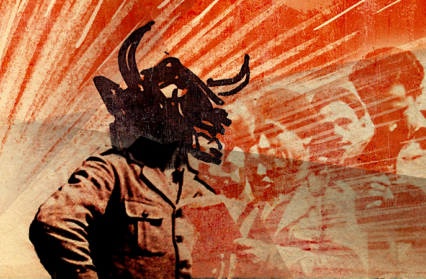Thomas Tyrrell reviews Shooting Rabbits, the debut production of the Sherman Theatre’s new company in residence, in association with Theatr Genedlaethol Cymru. Shooting Rabbits depicts the oft-forgotten Spanish Civil War.
Saethu Cwningod / Shooting Rabbits is the first play by the Sherman Theatre’s new company in residence, Powder House. It begins with its best scene: a meta-theatrical tour-de-force, wherein an Irish actor arrives to audition for the part of a partisan in the 1930s, going to fight in the Spanish Civil War. The Welsh director interrupts repeatedly, asking the Belfast-born actor to sound more like he’s from the Republic (“more Irish, yeah”), questioning him about the Troubles (which he doesn’t want to talk about) and proclaiming her views on Brexit and the Irish Border Question. “Wales stands with you,” she says, a final patronising touch that provokes the actor to an outburst. Who does she think he is, the Republicans, the Nationalists, the Protestants, the Catholics, the Sinn Fein, the DUP, the IRA? Who does Wales stand with, exactly?
The satire of easy political virtue signalling is spot on, and Neal McWilliams gives us a gripping performance as the outraged Irish actor, turning from humour to outrage with wonderful facility.
This is soon followed by another great scene where Alejandra Barcelar Pereira comes on stage, with self-confessed reluctance, to play the leader of fascist Spain, Generalissimo Francisco Franco. It’s a scene that gets the best out from the overlapping Babel of languages in this play, where we hear English, Welsh, Spanish and Basque. At first the dictator pauses to let the translations into Welsh and English play out, but then he launches into a furious rant that the translators struggle to keep pace with and finally give up on translating at all, the Welsh translator looking perceptibly bored, the English translator flustered and anxious.
Both of these are part of a cluster of fragmented early scenes through which can be distinguished the basic thread of a story of a young out-of-work Welshman who goes to fight in the International Brigade in the Spanish Civil War. We hear his words in the Irish actor’s audition, we see him reminiscing in an armchair as an old man, and we see him as a young man leaving his family behind, and we see him being mocked and challenged at the bookshop where he’s come to sign up.
This is followed by a nightclub dance number, because every play about a young man going to Spain needs to get in a joke about Benidorm and Magaluf. Thereafter the tenuous narrative loses its hold entirely, and the war scenes in Spain are entirely impressionistic, structured around soundscapes, interpretive dance and placards breaking things up into the various acts of a bullfight. At one point one of the actors dons a bull’s head, and I thought I recognised him as the second figure from the left in Picasso’s Guernica, but that identification really doesn’t help with the next scene, where the minotaur falls down and a nurse helps him back to his chair. Maybe he was supposed to be a bull after all, representing the Spanish nation? Or the Welsh soldier’s battle trauma?
If you care about the history, it’s disappointing not to see Anarchist Barcelona or Guernica given any attention, and if you don’t know anything about the Spanish Civil War, the action only leaves you more confused. It ends with a circular firing squad, which seems to be about Brexit again, and closes on an endearing note of self-awareness.
I would have liked the play to hold on to the narrative elements of the first act: to show more of what made the Spanish Civil War, a conflict Britain has largely forgotten, unique and important, and what drove so many idealist young men to join the International Brigades and fight in another nation’s war. But the play wants to make more general points about resistance to authority, gesturing towards the present day. It’s trying to have and eat a Spanish Civil War cake with Brexit icing and Catalan independence sprinkles, and the result is as messy as you’d expect. Its strengths are its sense of humour, which really comes to the fore in the opening and closing scenes, and its music, performed live by Sam Humphreys on the guitar, which gives the frequent soundscapes and dance numbers an engaging pulse and vitality.
Shooting Rabbits is on at the Sherman Theatr in Cardiff until May 4th.
You might also like…
Caragh Medlicott reviews the new play kicking off a new season at Cardiff’s The Other Room, American Nightmare by Matthew Bulgo.
Thomas Tyrrell is a regular contributor to Wales Arts Review.












